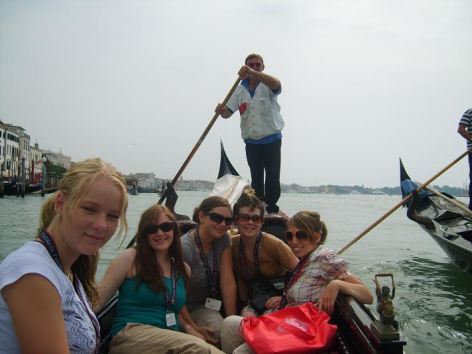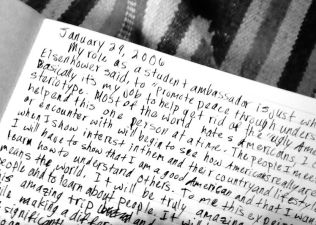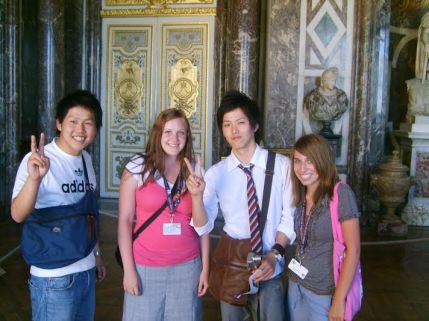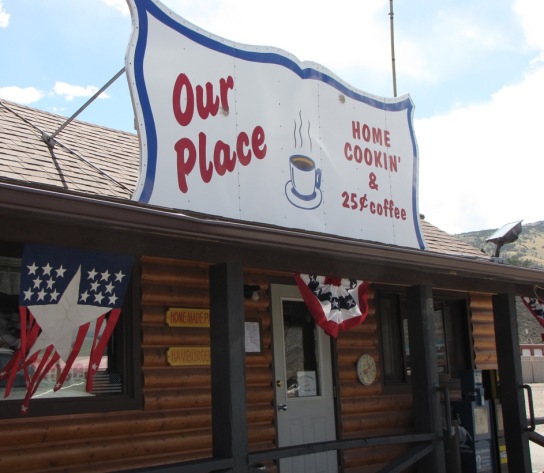During my sophomore year of high school, I participated in the People to People Student Ambassador Program which culminated in a three week trip to Europe. Along with approximately 20 other high school students from across the state of Utah, I traveled wide-eyed through the countries of Italy, Austria, Switzerland, and France. Highlights of the trip included the city of Rome, Italian pizza, learning to ride a bike along the tree-lined streets of Vienna (yes, I was 16 – that’s another story for another post), purchasing illegally recorded techno music at a shop in Switzerland, admiring the Mona Lisa in person, and discovering the Frank Popp Ensemble on MTV France.
Prior to the trip, we completed fundraising projects and attended informational meetings aimed at teaching us to be conscientious travelers. Here is the first entry in my journal reflecting on the opportunity to travel: “(1/26/2006) My role as a student ambassador is just what (President) Eisenhower said, to ‘promote peace through understanding.’ Basically, it’s my job to help get rid of the ‘ugly American’ stereotype. Most of the world hates Americans, I can help end this one person at a time. The people I meet or encounter with will begin to see how Americans really are when I show interest in them and their country and lifestyle. … To me, this experience means the world. It will be truly amazing. I love to meet people and to learn about people. It will be so cool to go on this amazing trip and see so many beautiful things while making a difference. … I know I’m a lot more than a simple tourist. I’m making a difference, that’s really important to me.”
Whoa! Talk about being an idealist! And being totally self-centered (“It’s my job …”)! This might warrant a brief explanation. The program was created by President Dwight D. Eisenhower, apparently with the romantic goal of counteracting cultural misunderstandings that lead to international conflict. The logic follows what travel writer Rick Steves terms Travel as a Political Act: “Rather than accentuate the difference between “us” and “them,” I believe travel should bring us together.” So we were teenagers being inundated with Eisenhower’s dream of “peace through understanding” (even though we did not yet have a full grasp of world history or our place in the world); I’m going to say that’s why this theme came across so heavily in my writing.
Of course, I was still a teenager – a boy-crazed one at that. Consider another entry from my travel journal: “(7/2/2006) … We also went to Versailles. It was a huge castle (sic). I was really impressed by it. Everything was beautiful. There were hot Asian guys there and they asked to take a picture with me. It was so funny, I laughed a lot and then we got a picture. Today was full of laughter.” My trip to Europe certainly broadened my own horizons – I experienced great art and culture and friendship and I explored the inner boundaries of myself; in that sense, it was the essence of a coming of age adventure. But I had little interaction with the people whose countries we traversed in a giant, gas guzzling bus and apparently had dreams of Taco Bell throughout the trip – it’d be hard to say the experience counteracted damaging stereotypes that lead to international conflict on either side of the isle.
If my little travel journal had been published it might also epitomize writer Debbie Lisle’s central complaint in her book The Global Politics of Contemporary Travel Writing: “Too many travel writers remain unaware of how their work contributes to and encourages the prevailing discursive hegemonies at work in global politics.” In my journal, 16-year-old me is practically regurgitating the limitting rhetoric Americans are fed by mainstream news and politicians about “the world” hating us for our “freedom.” There’s no awareness of the complexities of global interaction or what role travelers can play. Likewise, I wouldn’t fare too well on David Spurr’s checklist for a discourse of resistance: in his book Rhetoric of Empire he says discourse that resists power imbalance constructively deals with problems of language, representation, interest, and other voices. Is it bad that my travel journal didn’t succeed in this regard? No, I was 16 years old and in Europe for the first time!
But would it be wrong if I continued this presentation now? Yes. As I consider my future as a traveler and travel writer, I don’t necessarily want to abandon my youthful optimism for “peace through understanding;” however, I do want to move far beyond this optimism into a place of true understanding, that’s focused not on teaching those Europeans to love Americans, but on teaching myself to love Europeans (and all “foreign” groups I encounter when traveling). In describing his reason for traveling to Iran, Rick Steves says in this YouTube video “I believe it makes sense to know people before you bomb them.” But as Steves’ goes on to describe potential errors of translation between the United States and Iran, I can’t help but think: if we knew them, maybe we wouldn’t need to “bomb them.” Maybe understanding, does in the long run, promote peace.
Chances are slim that I’ll be returning to Europe (or traveling outside the country at all) any time soon, and that’s okay. Lucky for me, I literally live next to one of the world’s top tourist destinations: Yellowstone National Park. In the summer months, the wait time at local restaurants naturally grows longer. Last summer, to avoid starving to frustration at Our Place (a local breakfast diner), my boyfriend and I agreed to sit with a couple from Denmark. They were traveling the states on a route that had taken them from Las Vegas to Cody, WY. Next stop: Yellowstone. Over several giant plates of pancakes, we experienced real connection (and discussed the importance of purchasing bear spray before entering Yellowstone). It wasn’t me laughing at a tourist in another country, but all of us, speaking in broken bits of language and relying on hand gestures to communicate, laughing together at the observations this couple had made regarding their vastly different American destinations. Experiences like this can be common in Cody, WY, and I try not to shy away from them.




Heidi,
I can see your blog posts have really developed and deepened. It’s informative and integrates the course material, but you tell a story, and you share about yourself personally and professionally. I like the anecdotes about affirmative action in your community. It’s those little things that count, right? So often people think they have to be involved in some bureaucracy or organized movement, but it’s the butterfly affect, the footprints that count the most I think.
Rhea
Heidi:
Oh man, look at you, riding in the gondola in Venice. Wasn’t that fun? I know some folks are disappointed when they go to Venice because they don’t find it nearly as romantic as they thought they would. But I think those folks go at the wrong time of year. Summer in Venice is not good. As always I enjoyed your blog post. I will share with you just for the case of being accurate that Versailles, also a favorite visit, is a palace not a castle. There’s a difference.
I found your blog thoughtful and reflective. The only thing I would say is think about making two blogs out of this one as you may too many topics for one post. Other than that great job.
This is a multi-voiced Heidi! It is wonderful that you’ve retained your travel journal. I was thinking how much your journal entries had traces and echoes of the various voices we’ve been studying. Which voice do we choose to write in? What voice do you think is the one you want to make public?
Great post.
Yes, traces of an imperialist voice! For me, it was great to find some of my old “travel writing” and see how the critiques we’ve read could be applied to it. I think that’s a testament to how pervasive imperialist discourse is in the developed world. In class, it was hard for some of us to accept the idea that we might ever have, even inadvertently, espoused imperialist ideas – but the point is to recognize the discourse, and if we don’t like imperialism, to change it. I was 16 and believed in peace, but didn’t understand it.
Your blog posts have really grown as we have progressed throughout the course. I appreciate how you incorporated the course materials, without boring the reader. I too have looked back on some of my old travel journals and laugh at the stories. I definitely see the imperialist voice too – perhaps that might all just be because of our young age?
I am curious-how come “Chances are slim that I’ll be returning to Europe (or traveling outside the country at all) any time soon?” What’s stopping you? If it is funds our things of that nature I could give you a number of good travel deal websites. Don’t give up on seeing the world!
Hi Liz,
Thanks for your comment. It’s not so much about money, as it is priorities. Right now, my extra money and time go toward graduate school, volunteering at a local museum, and traveling home to spend as much time with my nephews and nieces as I can while they still enjoy being hugged and kissed by aunt Heidi! And I’m not giving up on seeing the world – I’m just not in a rush, I’m only 24 years old and find there’s plenty of exploring to do right where I live.